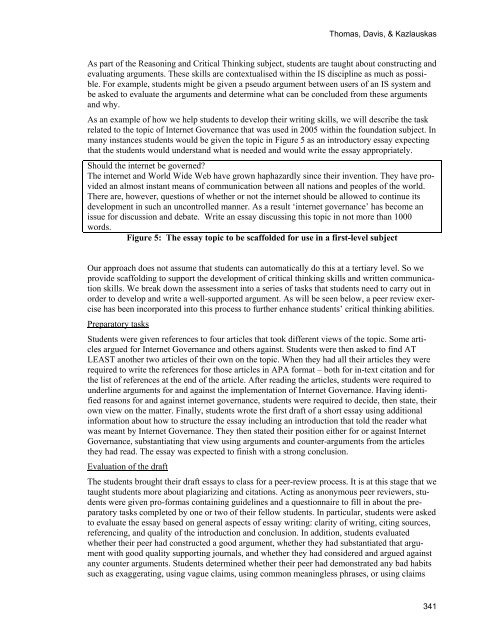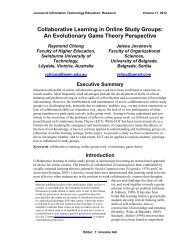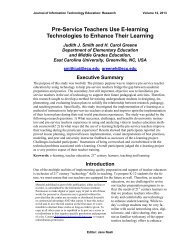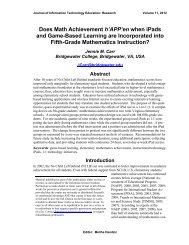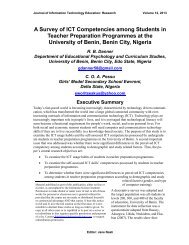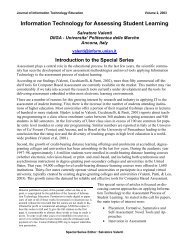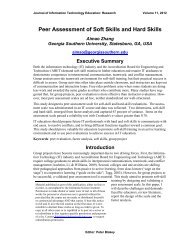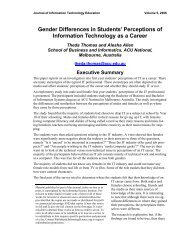Put Title Here Using Heading 1 Style - Journal of Information ...
Put Title Here Using Heading 1 Style - Journal of Information ...
Put Title Here Using Heading 1 Style - Journal of Information ...
Create successful ePaper yourself
Turn your PDF publications into a flip-book with our unique Google optimized e-Paper software.
Thomas, Davis, & Kazlauskas<br />
As part <strong>of</strong> the Reasoning and Critical Thinking subject, students are taught about constructing and<br />
evaluating arguments. These skills are contextualised within the IS discipline as much as possible.<br />
For example, students might be given a pseudo argument between users <strong>of</strong> an IS system and<br />
be asked to evaluate the arguments and determine what can be concluded from these arguments<br />
and why.<br />
As an example <strong>of</strong> how we help students to develop their writing skills, we will describe the task<br />
related to the topic <strong>of</strong> Internet Governance that was used in 2005 within the foundation subject. In<br />
many instances students would be given the topic in Figure 5 as an introductory essay expecting<br />
that the students would understand what is needed and would write the essay appropriately.<br />
Should the internet be governed?<br />
The internet and World Wide Web have grown haphazardly since their invention. They have provided<br />
an almost instant means <strong>of</strong> communication between all nations and peoples <strong>of</strong> the world.<br />
There are, however, questions <strong>of</strong> whether or not the internet should be allowed to continue its<br />
development in such an uncontrolled manner. As a result ‘internet governance’ has become an<br />
issue for discussion and debate. Write an essay discussing this topic in not more than 1000<br />
words.<br />
Figure 5: The essay topic to be scaffolded for use in a first-level subject<br />
Our approach does not assume that students can automatically do this at a tertiary level. So we<br />
provide scaffolding to support the development <strong>of</strong> critical thinking skills and written communication<br />
skills. We break down the assessment into a series <strong>of</strong> tasks that students need to carry out in<br />
order to develop and write a well-supported argument. As will be seen below, a peer review exercise<br />
has been incorporated into this process to further enhance students’ critical thinking abilities.<br />
Preparatory tasks<br />
Students were given references to four articles that took different views <strong>of</strong> the topic. Some articles<br />
argued for Internet Governance and others against. Students were then asked to find AT<br />
LEAST another two articles <strong>of</strong> their own on the topic. When they had all their articles they were<br />
required to write the references for those articles in APA format – both for in-text citation and for<br />
the list <strong>of</strong> references at the end <strong>of</strong> the article. After reading the articles, students were required to<br />
underline arguments for and against the implementation <strong>of</strong> Internet Governance. Having identified<br />
reasons for and against internet governance, students were required to decide, then state, their<br />
own view on the matter. Finally, students wrote the first draft <strong>of</strong> a short essay using additional<br />
information about how to structure the essay including an introduction that told the reader what<br />
was meant by Internet Governance. They then stated their position either for or against Internet<br />
Governance, substantiating that view using arguments and counter-arguments from the articles<br />
they had read. The essay was expected to finish with a strong conclusion.<br />
Evaluation <strong>of</strong> the draft<br />
The students brought their draft essays to class for a peer-review process. It is at this stage that we<br />
taught students more about plagiarizing and citations. Acting as anonymous peer reviewers, students<br />
were given pro-formas containing guidelines and a questionnaire to fill in about the preparatory<br />
tasks completed by one or two <strong>of</strong> their fellow students. In particular, students were asked<br />
to evaluate the essay based on general aspects <strong>of</strong> essay writing: clarity <strong>of</strong> writing, citing sources,<br />
referencing, and quality <strong>of</strong> the introduction and conclusion. In addition, students evaluated<br />
whether their peer had constructed a good argument, whether they had substantiated that argument<br />
with good quality supporting journals, and whether they had considered and argued against<br />
any counter arguments. Students determined whether their peer had demonstrated any bad habits<br />
such as exaggerating, using vague claims, using common meaningless phrases, or using claims<br />
341


